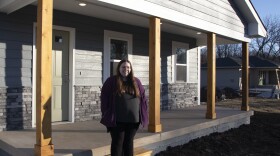A federal district court on Tuesday dismissed a lawsuit leveled against the city of Shawnee for its controversial “co-living ban.”
Shawnee resident Val French and Prairie Village-based property management company HomeRoom, Inc. filed a lawsuit in May in federal district court in Kansas City, Kansas, attesting that the city’s ordinance, which restricts how many unrelated people can live in a home, violated their constitutional rights.
Federal judge Holly L. Teeter ultimately sided with the city, citing legal precedent that the petitioners have no constitutional claims.
In April 2022, the Shawnee City Council adopted the ordinance, which effectively limited the number of unrelated people who can live together in a single living space to three.
The rule also prevents companies, like HomeRoom, or private residents from buying residential properties and using them for room-by-room rentals unless the occupants are related.
Backlash to the rule change was swift last year. An online petition was signed by nearly 450 people, and some community members protested outside City Hall.
Shawnee this year has also considered steps to ban short-term rentals, like AirBnBs, in its single-family residential neighborhoods. While the city council recently discussed it in a committee meeting, city staff have yet to outline suggested changes.
The petitioners argued city exceeded its land-use authority
The lawsuit alleged Shawnee exceeded its authority to decide zoning, land-use intensity, occupancy and other building codes by passing a rule that “regulates land users,” not the land itself.
In addition to the city, the lawsuit names city manager Doug Gerber and city code enforcement officer Kevin Messick as defendants. Judge Teeter dismissed those claims as well, saying they’re redundant to the petitioners’ claims against the city of Shawnee.
The plaintiffs were not seeking any monetary damages, but instead want the court to stop the city from enforcing the ordinance.
Judge Teeter agreed with the city’s reasoning that HomeRoom is a corporate entity with no constitutionally protected right of intimate association.
It also agreed that HomeRoom can’t assert the rights of current and future tenants who are unrelated to each other.
The court also found that the ordinance does not violate French’s constitutional rights of substantive due process or the Equal Protection clause under the Fourteenth Amendment.
In response to the dismissal, Shawnee’s communications director Doug Donahoo told the Post in an email that the city was satisfied with the decision.
HomeRoom’s attorney said the fight is not over
David Deerson, an attorney with Pacific Legal Foundation, who is representing Homeroom Inc., told the Post he expected the dismissal.
He explained the court’s decision was based on what he viewed as outdated cases, such as the Supreme Court’s decision in 1974 in the case of Village of Belle Terre v. Boraas, which upheld the constitutionality of a residential zoning ordinance that limited the number of unrelated individuals who may inhabit a dwelling.
“It’s been widely ridiculed by the academic community and legal commentators, and there have been other developments in conceptually-related cases that suggest that ‘Hey, there actually is a fundamental right under the Constitution to form these kind of intimate, private associations,” he said.
Deerson said Pacific Legal Foundation plans to appeal the decision to the United States Court of Appeals for the Tenth Circuit.
“[We’re] seeing if we can generate some good federal precedent that you have a right to choose the people you live with and local government doesn’t really have any legitimate business telling you who can live with and who you can’t,” he said.
This story was originally published on the Shawnee Mission Post.
Copyright 2023 KCUR 89.3. To see more, visit KCUR 89.3. 9(MDA4OTAxNzAzMDEzMjc0MTc2MzA5ZDZlMw004))







